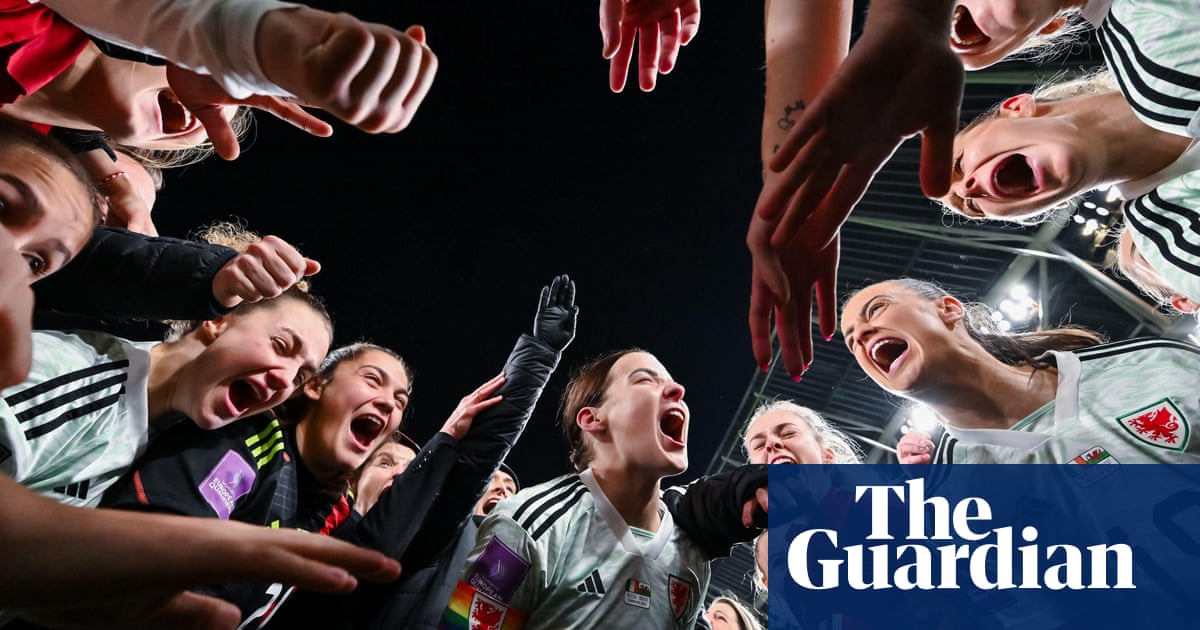This article is part of theGuardian’sEuro 2025 Experts’ Network, a cooperation between some of the best media organisations from the 16 countries who qualified. theguardian.com is running previews from two teams each day in the run-up to the tournament kicking off on 2 July.
Wales are making their long-awaited debut at a major tournament, but they are not content to travel to Switzerland as glorified tourists. They aim to emulate their male counterparts at France 2016 and travel deep into the knockout phase.
Not that escaping the initial group stage – let alone reaching the semi-finals – will be easy for a side grouped with England, France and the Netherlands. Despite some springtime Nations League knocks – most notably June’s4-1 home lossto Italy – they remain undeterred.
That Italy reverse apart, the team ranked 30th in the world have never conceded more than twice in a game or lost by more than a single goal during Rhian Wilkinson’s 15-month reign. This year they twice held the highly regarded Sweden to 1-1 draws, with those performances suggesting they have improved almost beyond recognition since Wilkinson succeededGemma Graingerlast year.
Wilkinson has created a hybrid, uber-flexible playing style and, alternating between a back three and a back four, rotates her squad depending on the opposition. “We’ve grown so much under Rhian,” says the captain, Angharad James. “She’s taken us to another level.”
If much depends on Jess Fishlock, the still impressive 38-year-old midfielder, and national leading scorer, raging against the light and the similarly influential Sophie Ingle proving her fitness, the squad possesses healthy depth and dynamism. As Fishlock says: “Players have come to life under Rhian.”
The grassroots women’s game in Wales has enjoyed a 45% growth in participation since 2021, while attendances for internationals have risen dramatically, with a record crowd of 16,865 watchingthe first legof November’s Euro 2025 qualifying playoff against the Republic of Ireland in Cardiff. Since 2023, men and women have been paid equally for representing Wales.
The 43-year-oldRhian Wilkinsoncomes equipped with the tournament experience her players lack. Although Wilkinson’s mother is Welsh and her late father English, she was born in Montreal and, bar a solitary childhood year spent in the Vale of Glamorgan, grew up mainly in Quebec before winning 183 capsfor Canada as a defender. Along the way she collected two Olympic bronze medals and a Pan-American Games gold and played for assorted clubs in the United States and Norway. She was as a highly regarded assistant coach with Canada and England before becoming head coach of Portland Thorns, whom she took to the NWSL title. She stepped down in December 2022 after an investigation into a relationship with a player at the club, despite it clearing Wilkinson of any wrongdoing.
Now Wilkinson has led Wales into their first major tournament. To say she has proved transformational is an understatement. A music lover, Wilkinson is an accomplished cellist who emphasised her sporting versatility by starring at ringette, a form of ice hockey, in her youth.
Even at 38,Jess Fishlockis eminently capable of switching the lights on for Wales. Much more than just her country’s record goalscorer, the holder of 162 caps is a versatile, tempo-setting midfielder who has swapped her native Cardiff for life by the Pacific with Seattle Reign. While she has won numerous honours in the US, Fishlock has also won the Champions League with FFC Frankfurt and Lyon and domestic titles at Seattle, Melbourne City and AZ Alkmaar. In 2018, she was awarded the MBE for services to women’s football and the LGBT community. “Jess is an icon of Welsh sport and an unbelievable player,” says Wilkinson. “She’s a great person and a great talent. She provides magic moments. Whenever Jess is on the field something’s happening. She’s one of football’s special talents.”
Sign up toMoving the Goalposts
No topic is too small or too big for us to cover as we deliver a twice-weekly roundup of the wonderful world of women’s football
after newsletter promotion
Wales do not generally concede too many goals andOlivia Clark’s reassuring presence represents a big reason why. The Lincolnshire-born goalkeeper is still only 23 and it is not so long ago she was playing for Nettleham in the seventh tier of England’s domestic game. Now she is at Leicester, where she works with Tom Pressman, the senior Wales goalkeeping coach, who has the same role at her club. Clark credits Pressman with turning her into a first-choice international and last January his presence at Leicester prompted her to leave the Netherlands where she had been playing Champions League football for Twente.
The football pyramid in Wales, overseen by the Welsh FA, has four tiers. The top division is semi-professional and its title winners qualify for the Champions League preliminary rounds. In recent years attendances for key top-flight games have risen from the hundreds into, on some occasions, the thousands. Media coverage is growing, but remains limited and heavily localised. Only one Wales-based team plays in the English League pyramid where Gwalia United, formerly Cardiff City Ladies, reside in the third tier. Although many Wales internationals initially emerge from their country’s domestic system, the squad are all full-time professionals employed outside Wales.
Given Wales have ended up in the “Group of Death” – also featuring England, France and the Netherlands – reaching the knockout phase will be tough. That, though, is where Wilkinson firmly believes her team belongs. Opponents will underestimate a side with the potential to disrupt the established order at their peril.
